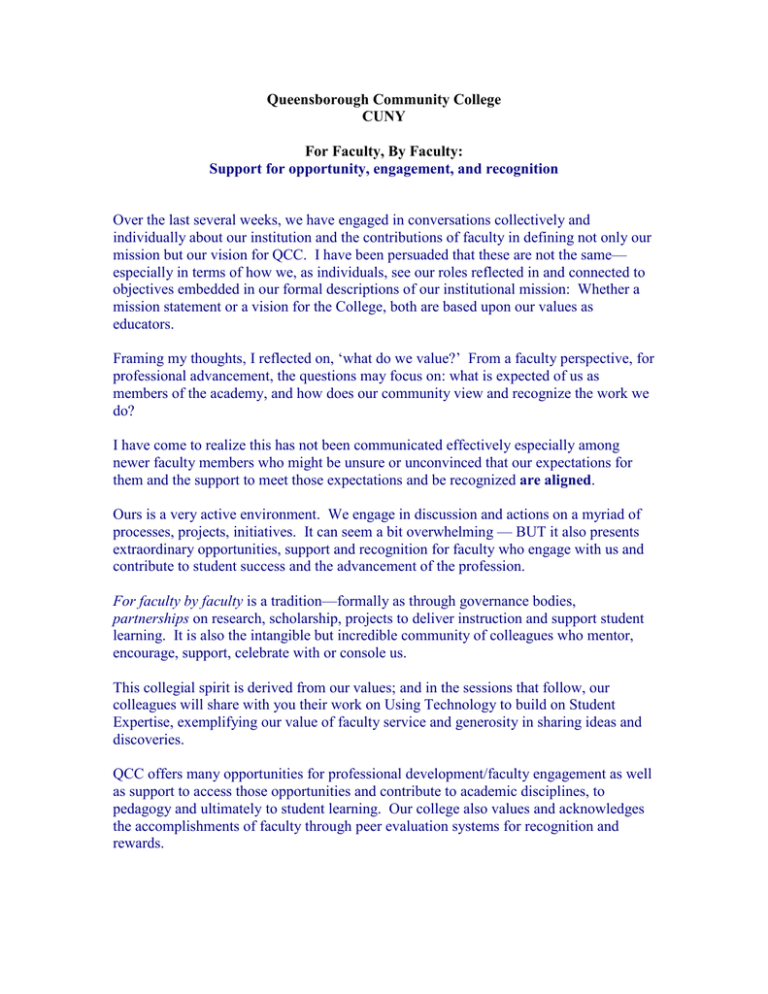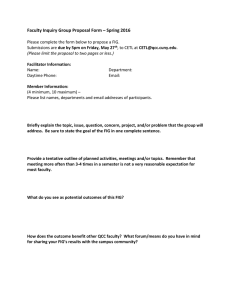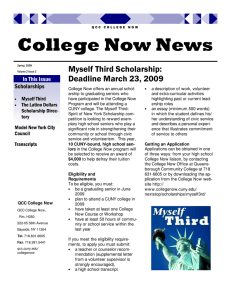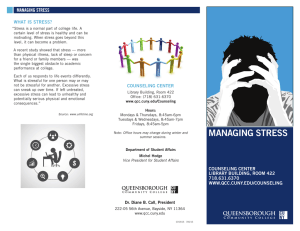Queensborough Community College CUNY For Faculty, By Faculty:
advertisement

Queensborough Community College CUNY For Faculty, By Faculty: Support for opportunity, engagement, and recognition Over the last several weeks, we have engaged in conversations collectively and individually about our institution and the contributions of faculty in defining not only our mission but our vision for QCC. I have been persuaded that these are not the same— especially in terms of how we, as individuals, see our roles reflected in and connected to objectives embedded in our formal descriptions of our institutional mission: Whether a mission statement or a vision for the College, both are based upon our values as educators. Framing my thoughts, I reflected on, ‘what do we value?’ From a faculty perspective, for professional advancement, the questions may focus on: what is expected of us as members of the academy, and how does our community view and recognize the work we do? I have come to realize this has not been communicated effectively especially among newer faculty members who might be unsure or unconvinced that our expectations for them and the support to meet those expectations and be recognized are aligned. Ours is a very active environment. We engage in discussion and actions on a myriad of processes, projects, initiatives. It can seem a bit overwhelming — BUT it also presents extraordinary opportunities, support and recognition for faculty who engage with us and contribute to student success and the advancement of the profession. For faculty by faculty is a tradition—formally as through governance bodies, partnerships on research, scholarship, projects to deliver instruction and support student learning. It is also the intangible but incredible community of colleagues who mentor, encourage, support, celebrate with or console us. This collegial spirit is derived from our values; and in the sessions that follow, our colleagues will share with you their work on Using Technology to build on Student Expertise, exemplifying our value of faculty service and generosity in sharing ideas and discoveries. QCC offers many opportunities for professional development/faculty engagement as well as support to access those opportunities and contribute to academic disciplines, to pedagogy and ultimately to student learning. Our college also values and acknowledges the accomplishments of faculty through peer evaluation systems for recognition and rewards. I share with you illustrations of these opportunities, support available and the recognition/rewards conferred, perhaps new to some, a reminder to others, but important for all faculty to know ---- in addition to teaching and scholarship, we as an institution, value faculty engagement within and across disciplines as well as in the activities and initiatives of the College. Teaching and scholarship are traditional elements of our profession and Faculty are evaluated by their peers on these accomplishments. We also value service - to the department, to the College, to the University and for the advancement of our academic disciplines and community college pedagogical research. The opportunities for professional development and for faculty to engage and contribute through dissemination of research as well as SERVICE are many. Some examples: Workshops/seminars offered by the Office of Academic Affairs (OAA), Center for Excellence in Teaching and Learning (CETL), the Academic Computing Center (ACC), and the University Conferences –in academic disciplines and pedagogy (international, national, and regional and those sponsored by the University in General Education and in Technology---and our own such as this, the Conference of the College and the Convocation of the College, scheduled for January 26, 2010. Participation in governance—service and contributions to faculty, college and University committees Participation in departmental and institutional activities: development of rubrics to assess student learning outcomes; Service Learning; Writing Intensive (WI) program; Instructional Technology such as —e Portfolio, pod casting; Distance education; student recruitment and advisement Participation in grant-funded projects---individual, collaborative, and institutional There are opportunities for Involvement in QCC’s supplemental education opportunities —the Art Gallery, Performing Arts Center and Kupferberg Holocaust Resource Center as well as cocurricular activities as advisors and as mentors to students for publications, the arts and research. Participation in our Campus Sustainability effort have benefited students and our institution. The contributions of faculty to our 50th anniversary celebrations are examples of wonderful service to the College community. Among the many: Megan Elias and Peter Bales for their work on documenting QCC’s history through a photo essay, and Professor Bonous-Smit and Professor Connie Williams for sharing with the community College events over the years and interesting facts about the college: Thank you!!! I hope I have clarified what we value and how you might access opportunities to demonstrate your skills as educators and your service. HOWEVER, for faculty to engage in these activities and make meaningful contributions requires support and it is offered in many ways: OAA Orientation activities for new faculty and new adjunct faculty offer information, an opportunity to meet new colleagues and an introduction to activities we value: This year, the development of rubrics for assessment of learning outcomes, and WI initial training session Mentoring: chairpersons and peers within and across departments Through collective bargaining agreements, new faculty members in professorial ranks receive 24 hours of released time to support professional development, research and scholarship activities. NOTE: Before this contractual arrangement, Dr. Marti provided three hours of released time to new faculty for these purposes. Also through collective bargaining there is Funding PSC for faculty/HEO travel to professional conferences –$41K per year Grant support: CETL grants; PSC/CUNY and CCIG for individual and collaborative research –and the help of colleagues in Sponsored Programs Our QCC Foundation annually provides $25K in funding for faculty/HEO travel to professional conferences and research activities. In 2009-2010, OAA has made available $100K for faculty/HEO travel to present their research at professional conferences And the President has committed QCC’s 2009 PMP—performance management program award of $65K to support faculty/HEO research in community college pedagogy (information and applications are available. Workshops by Paul Marchese and Meg Tarafdar scheduled in CETL this afternoon at 2 and again on Monday at 3 to assist faculty with development of an idea/proposal for CC pedagogical research But----Your greatest resources are your peers----and a cadre of very special colleagues has been assembled to provide support ----for faculty by faculty--- Faculty development Leaders----CETL Associates, OAA Faculty Fellows and faculty coordinators of our initiatives are faculty working with faculty, often one to one ---CETL Associates Margot Edlin and Peter Bales for faculty development of learning outcomes rubrics; Maureen Wallace, working with faculty on pedagogical research and publications; Jo Pantaleo and Sharon Ellerton in support of Service Learning; Lorena Ellis and Phil Pecorino—Distance Education; Christine Mooney the use of instructional technology; Ed Hanssen –e Portfolio; the Faculty Coordinators for the Freshman Academies: Moni Chauhan, Bob Kueper, Anne Marie Bourbon, Linda Stanley, Megan Elias and Renee Rhodd working with colleagues within each academy on high impact activities and the assessment protocol; the Writing Intensive coordinators Linda Stanley, David Humphries, John Talbird, Megan Elias, Jeff Jankowski; and working with faculty in the academies as liaisons from Basic Skills and Math: David Rothman and Sylvia Svitak. In sum, there are Opportunities to engage and support to access them. Rewards and recognition for faculty are based upon demonstrated excellence in teaching, research/scholarship and service. Peer Recommendations for Reappointment, tenure, and promotion ARE aligned with accomplishments in these areas. –and we have made the commitment as an institution to provide opportunities and support for faculty to do so. But in our professional lives— often decades long, there are only two or three promotions of rank to achieve. WHY STAY ENGAGED???? BECAUSE, our institution’s vitality and excellence depends upon continued faculty engagement, while they seek and achieve our highest rank—and beyond. There are other ‘rewards’----individuals are recognized---- National teaching awards, our own Faculty Excellence awards for scholarship, the Faculty Executive Committee (FEC) awards today, the Academic Senate’s honor of service through governance; Selection as the QCC Presidential Lecturer. Since 2001, nine of our professors have received that honor: (still in active service) Caf Dowlah, Sasan Karimi, Paul Tschinkel, David Humphries, Jean Murley—and Dr. Megan Elias was chosen to address us in spring 2010; Many QCC faculty are selected to represent the college in university-wide efforts. David Shimkin was selected to serve on CUNY’s CPE task force; Jeanne Galvin and Philip Pecorino represent us on the new community college advisory group; And our community celebrations--- to welcome new faculty, to congratulate tenured professors, and to show for our 20, 30 and 40 years of service---and at the conclusion of active service Rewards may be released time, or stipends, or recognition for special achievement and service. But all are modest. SO-----Why do faculty continue to be engaged?—a Commitment to teaching and student learning, a desire to contribute to the college as an organization ….a belief that we make a difference in many lives. Why must faculty remain engaged? Because Engagement by individual faculty within and across disciplines in a variety of initiatives and projects through shared governance leads to inquiry, an exchange of ideas, ---and a constructive dialogue to develop, test hypotheses, evaluate outcomes and apply what we learn for continuous improvement for institutional effectiveness. Faculty engagement in these dialogues is what shapes our vision for the college---and ideally, each of us will see our connection to and individual contribution to it. Vision develops organically—and the process is as important as the outcome. Vision must be debated and formulated through consensus. Your engagement in these conversations is vital. There are opportunities and support and rewards, professional and personal, to do so. I urge you to take advantage of them as offered - for faculty, by faculty - and in our tradition, to pay it forward to colleagues here and to come. Dr. Diane Call Conference of the College October 30, 2009


